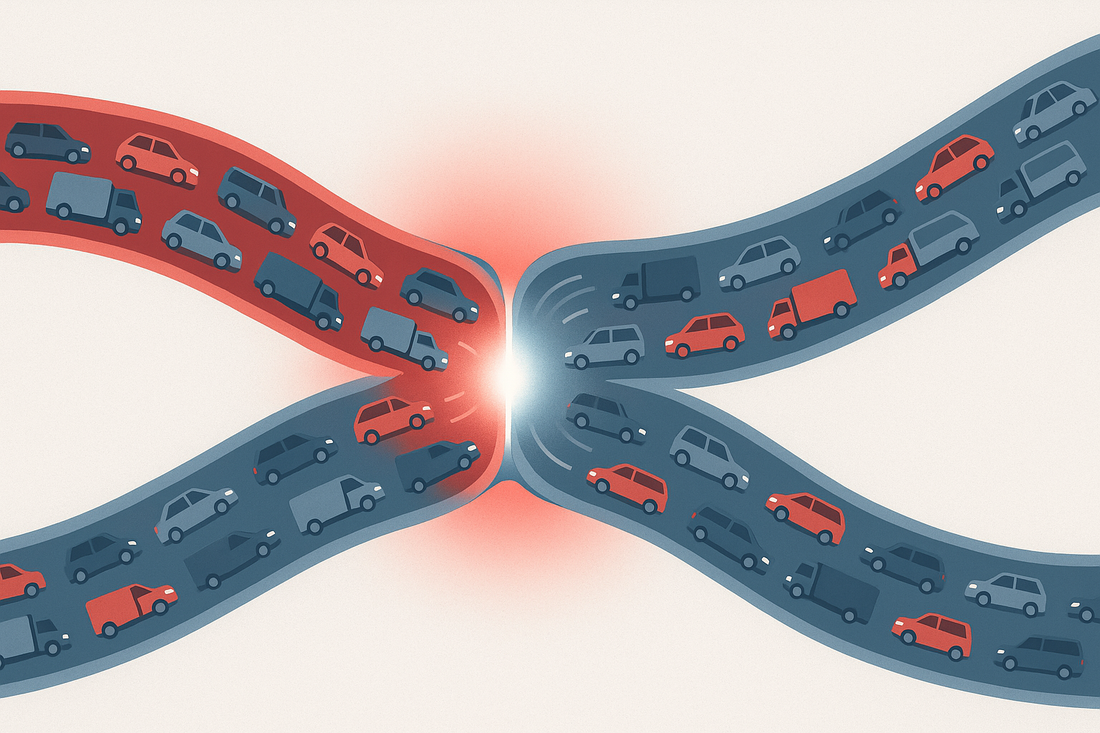
The Hidden Circulation Problem Behind Prostate Symptoms: What the Research Really Shows
Share
For decades, American doctors have treated frequent nighttime bathroom trips and prostate discomfort as a simple “enlarged prostate” problem. But research from Europe and new global studies are revealing something different: circulation.
Let’s walk through what the science says about pelvic blood flow, prostate pressure, and natural circulation-supporting compounds—so you can see why FlowRegen is designed the way it is.
Europe vs. America: Two Very Different Approaches
In Europe, vascular specialists have long recognized that poor circulation in the pelvic area can contribute to urinary problems at night. That’s why their vascular guidelines (ESVS 2022) recommend venoactive drugs—plant extracts like horse chestnut, butcher’s broom, and grape seed—to support comfort and blood flow in people with venous insufficiency. Read the guideline here (PDF).
By contrast, in the U.S., the conversation has focused almost exclusively on medications that shrink or relax the prostate (alpha-blockers, 5-alpha-reductase inhibitors). While the latest American guidelines acknowledge “drugs and nutritional supplements” for venous disease, these plant-based options are rarely emphasized. See the SVS/AVF/AVLS 2024 guidelines summary.
This difference matters: European doctors often combine circulation support with lifestyle changes, while Americans are still told “your prostate is too big” and handed another prescription.
Why Nighttime Bathroom Trips Aren’t Always About “Prostate Size”
Multiple studies show that prostate volume and urinary symptoms don’t always match up:
-
A classic study found only a weak correlation between prostate size and symptoms like nocturia or weak stream (Barry et al., 1992).
-
A newer Nigerian study confirmed the same finding—men with very large prostates sometimes had mild symptoms, and vice versa (Nigerian Journal of Clinical Practice, 2022).
Meanwhile, AUA guidelines and reviews from StatPearls make it clear: nocturia is often caused by things like fluid shifts, poor venous return, bladder issues, and even sleep problems—not just prostate growth (AUA Overactive Bladder Guideline, StatPearls Nocturia).
One striking example? Studies show that leg swelling during the day redistributes at night, irritating the bladder and waking men up (AHA Circulation Research, 2010).
Big Pharma’s Prostate Problem
Prescription drugs have their place—but they also come with controversies:
-
Finasteride/Dutasteride (5-alpha-reductase inhibitors): The FDA warns they may increase the risk of high-grade prostate cancer, even while reducing overall cancer rates. FDA Safety Communication.
-
Reports of persistent sexual dysfunction and depression have led to multiple label changes in the U.S. and Europe (FDA Label, 2021).
-
Alpha-blockers work to improve urinary symptoms, but large reviews show similar efficacy across drugs with different side effects—meaning men often end up cycling through multiple prescriptions (Cochrane review summary).
No wonder so many men are looking for alternative or complementary solutions that don’t carry the same risks.
What the Research Says About FlowRegen’s Key Ingredients
Here’s where the European science comes in—centuries of use, plus modern randomized trials.
-
Horse Chestnut (Aescin): A Cochrane review of 17 randomized trials found it significantly reduces leg pain and swelling in chronic venous insufficiency (Cochrane Library).
-
Butcher’s Broom (Ruscus aculeatus): In a placebo-controlled RCT, it improved venous tone and circulation comfort over 12 weeks (PubMed).
-
Grape Seed Extract (Proanthocyanidins): A pilot trial using 4D MRI showed it increased venous blood-flow velocity when added to compression therapy (Open-access full text).
-
Stoneroot (Collinsonia canadensis): Traditionally used for venous congestion and hemorrhoids. Modern clinical trials are lacking, so we treat this as a traditional herbal support rather than a proven therapy (Botanical review).
The Bottom Line
-
Europe has long embraced natural venoactive compounds for circulation and urinary comfort.
-
The U.S. is still playing catch-up, with guidelines dominated by drug and surgical approaches.
-
The latest research shows that nighttime bathroom trips often start with circulation problems—not just prostate size.
-
Natural extracts like horse chestnut, butcher’s broom, and grape seed have credible evidence for supporting venous health, while pharmaceutical options face growing safety controversies.
For men looking to support their circulation and reduce nighttime disruptions, it makes sense to pay attention to what the science—and decades of European clinical practice—are showing.
